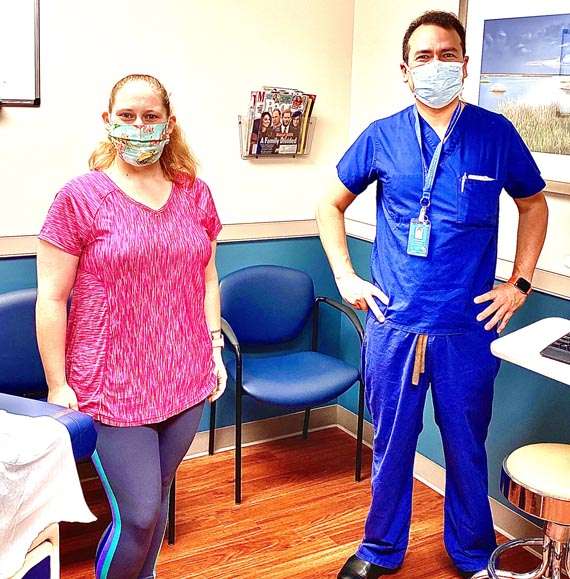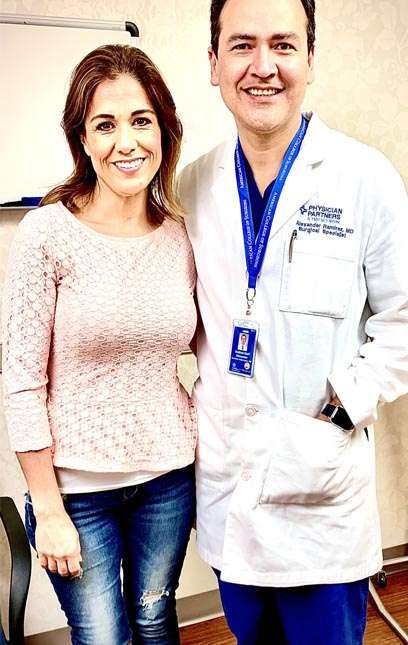Sleeve Gastrectomy in Petersburg, FL
At Premiere Bariatric Surgery in St. Petersburg, Florida, Dr. Alexander Ramirez performs robotic sleeve gastrectomy procedures for patients who have failed to achieve their weight reduction goals through diet and exercise. Along with the doctor’s expert guidance before, during and after the procedure, this less invasive method of bariatric surgery offers the potential for significant and sustainable weight loss. If your quality of life and overall health are impacted by excess weight that you have been unable to lose on your own, then a robotic sleeve gastrectomy may be the solution that will help you finally achieve life-changing weight loss results. What Are the Advantages and Disadvantages Candidates Should Consider? The effectiveness and minimally invasive nature of the procedure have contributed to the robotic sleeve gastrectomy becoming the most commonly performed bariatric procedure worldwide. However, as with any approach to treatment that involves choosing from among different surgical methods, there are different factors for consideration. Here are some of the key advantages and disadvantages of the procedure.Advantages
- The surgery restricts the amount of food the stomach can hold.
- Induces rapid and significant weight loss with results similar to that of traditional gastric bypass. Weight loss of >50% for 3-5+ year data, and weight loss comparable to that of the bypass with maintenance of >50%
- It requires no foreign objects or re-routing of the food stream.
- Requires a relatively short hospital stay of approximately 2 days.
- Causes favorable changes in gut hormones that suppress hunger, reduce appetite and improve satiety.
- The recovery is less painful and the surgery is minimally invasive, requiring only three incisions.
Disadvantages
- Is a non-reversible procedure
- Has the potential for long-term vitamin deficiencies
- Has a higher early complication rate than the adjustable gastric band.
How Does Robotic Sleeve Gastrectomy Work?
The Robotic Sleeve Gastrectomy – often called the sleeve – involves the use of a robotic surgical device that is equipped with a camera to remove approximately 80 percent of the stomach. The remaining stomach is a tubular pouch with a shape that resembles a sleeve. The procedure offers less discomfort during recovery as compared to traditional surgical methods and requires only three small incisions. The robotic sleeve gastrectomy works to support weight loss by several mechanisms. First, the new stomach pouch holds a considerably smaller volume of food, significantly reducing caloric absorption. The greater impact, however, seems to be the effect the surgery has on gut hormones that influence hunger frequency, appetite satiety and the ability to better control blood sugar levels. The procedure only takes around one to two hours to perform. During the surgery, patients are placed under general anesthesia. Three very small incisions are created in the upper abdomen. Through these, a section of the stomach is removed, and then a sleeve is created through vertical stapling of the remaining stomach. Incisions are closed with stitches, medical tape, or medical glue. Short term studies show that the sleeve is as effective as the roux-en-Y gastric bypass in terms of weight loss and improvement or remission of diabetes. There is also evidence that suggests the sleeve, similar to the gastric bypass, is effective in improving type 2 diabetes independent of weight loss. The complication rates of the robotic sleeve gastrectomy fall between those of the adjustable gastric band and the roux-en-y or traditional gastric bypass.Robotic Bariatric Surgery for Less Discomfort During Recovery
The robotic sleeve gastrectomy offers less discomfort during recovery, following the surgery a short stay at the hospital is necessary (typically only two days). Pain medication will be prescribed to address any discomfort and should be taken as prescribed. Diet will change gradually, starting with cups of ice immediately after the procedure and moving to clear liquids. Soft foods will eventually be permissible, and solid food will be permissible after 8 weeks. Patients should avoid physically strenuous activities for 4 to 6 weeks. However, walking is encouraged and will get easier with time. Patients should be gentle with their body while it is healing and will have decreased energy levels. Patients must take time off from work, usually 3 to 4 weeks, to rest and recover. Regular follow-up appointments will be required to ensure that healing is going as expected. The full recovery process typically takes around 6 to 8 weeks.Learn More About Medical Weight Loss and Bariatric Surgery
If you would like to find out more about a personalized medical weight loss plan and your options for bariatric surgery, we invite you to request a consultation with Dr. Ramirez. The doctor is a board-certified surgeon and has specialized in bariatric and gastrointestinal procedures for many years. To learn more about weight reduction with robotic sleeve gastrectomy, contact us today to schedule your consultation at Premiere Bariatric Surgery in St. Petersburg, FL.Robotic Sleeve Gastrectomy: FAQs
What Makes Someone a Good Candidate for Robotic Sleeve Gastrectomy?
Good candidates for robotic sleeve gastrectomy are individuals who have a body mass idex (BMI) of 40 or higher, or those with a BMI between 35 and 40 who also have obesity-related conditions, such as type 2 diabetes, high blood pressure, or severe sleep apnea. Candidates should also have a history of unsuccessful weight loss with diet and exercise alone. Additionally, candidates should be committed to making significant lifestyle changes and participate in long-term follow-up care. Potential candidates must undergo a thorough evaluation to discuss the risks and benefits of the surgery.
How Does Robotic Sleeve Gastrectomy Compare to Other Weight Loss Surgeries?
Robotic Sleeve Gastrectomy is often compared to other bariatric surgeries like Roux-en-Y Gastric Bypass and Adjustable Gastric Banding. Unlike Gastric Bypass, which reroutes the digestive tract, the procedure is a restrictive procedure that does not alter the intestines, and is considered to have the potential for fewer complications in some patients than a gastric bypass. It offers more significant weight loss compared to the Gastric Band, which is less invasive and reversible, but also typically results in less weight loss and may require more follow-up adjustments.
What Lifestyle Changes Are Required After Undergoing Sleeve Gastrectomy?
After undergoing a robotic sleeve gastrectomy, significant lifestyle changes are essential to ensure effective weight loss and the maintenance of a healthy weight long-term. These changes include adhering to a nutritionally balanced, high-protein, low-calorie diet, and avoiding high-sugar and high-fat foods. Regular physical activity is crucial, as is drinking plenty of water but avoiding drinking during meals. Patients must also avoid alcohol and smoking, attend regular follow-up appointments, and take vitamin and mineral supplements to prevent deficiencies.
The Procedure
This procedure works by several mechanisms. First, the new stomach pouch holds a considerably smaller volume than the normal stomach and helps to significantly reduce the amount of food (and thus calories) that can be consumed. The greater impact, however, seems to be the effect the surgery has on gut hormones that impact a number of factors including hunger, satiety, and blood sugar control. The procedure only takes around one to two hours to perform. During the surgery, patients are placed under general anesthesia. Several very small incisions are created in the upper abdomen. Through these, a section of the stomach is removed, and then a sleeve is created through vertical stapling of the remaining stomach. Incisions are closed with stitches, medical tape, or medical glue. Short term studies show that the sleeve is as effective as the roux-en-Y gastric bypass in terms of weight loss and improvement or remission of diabetes. There is also evidence that suggest the sleeve, similar to the gastric bypass, is effective in improving type 2 diabetes independent of the weight loss. The complication rates of the sleeve fall between those of the adjustable gastric band and the roux-en-y gastric bypass.



The Recovery Process
After a Laparoscopic Sleeve Gastrectomy, a short stay at the hospital is necessary (typically only 2 days). Pain medication will be prescribed to address any pain and should be taken as prescribed. Diet will change gradually, starting with cups of ice immediately after the procedure and moving to clear liquids. Soft foods will eventually be permissible, and solid food will be permissible after 8 weeks. Patients should avoid physically strenuous activities for 4 to 6 weeks. However, walking is encouraged and will get easier with time. Patients should be gentle with their body while it is healing and will have decreased energy levels. Patients must take time off from work, usually 3 to 4 weeks, to rest and recover. Regular follow-up appointments will be required to ensure that healing is going as expected. The full recovery process typically takes around 6 to 8 weeks.Advantages
- Restricts the amount of food the stomach can hold
- Induces rapid and significant weight loss that comparative studies find similar to that of the Roux-en-Y gastric bypass. Weight loss of >50% for 3-5+ year data, and weight loss comparable to that of the bypass with maintenance of >50%
- Requires no foreign objects (AGB), and no bypass or re-routing of the food stream (RYGB)
- Involves a relatively short hospital stay of approximately 2 days
- Causes favorable changes in gut hormones that suppress hunger, reduce appetite and improve satiety
Disadvantages
- Is a non-reversible procedure
- Has the potential for long-term vitamin deficiencies
- Has a higher early complication rate than the AGB
